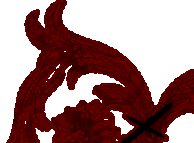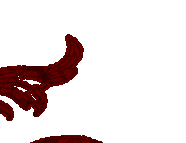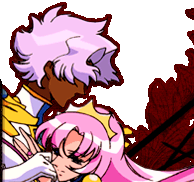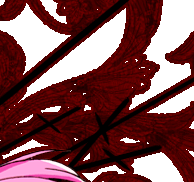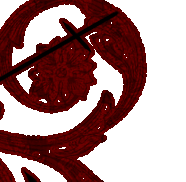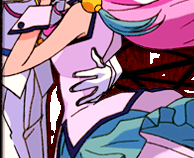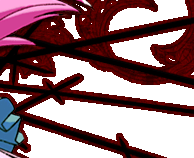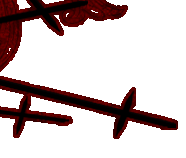

There are often connections in Revolutionary Girl Utena that we, as the audience, take
for granted. We never really think about some of the things that underlie
the turmoil of Utena’s quest, Anthy’s quiet struggles,
and the manipulations of the master chess player, Akio. The fact is
that while these events make up the story at the forefront, there
is much to wonder at in the background of the series—for instance,
what is the connection between Nanami and Anthy? Though their ends
are opposite, why is there a strange similarity between Kozue and
Shiori? Where is the hidden connection?
The series
is fueled by personality—not just characterization, personality.
Ikuhara and Saito could not have made this series work without injecting
life into the characters, a life that can be drawn out and seen
for what it is if one looks closely enough. The little details about
the characters can illustrate a much larger life, a history of sorts
that gives us insight into how they came to be the way they are,
and how the pieces in Akio’s master plan fit so beautifully
together.
One of the most overlooked factors is, in my opinion, the interaction
between Touga and Miki. The fan favorites amongst the males of the
cast, Miki is favored for his innocence, his earnest desire to do
right, and of course, the tenderness and vulnerability he displays.
Touga, on the other hand, is generally viewed as a dominant and
emotionally stable character with no real inclination to tenderness
unless he’s in the company of someone who desires it from
him—naturally, women. So what is the strange connection between
these two characters? (You shut up. I’m talking to you, yaoi
fans.)
Miki and Touga seem to have no real connection at first glance—one
wouldn’t think that these two would have anything to talk
about outside of Seitokai business. In the cases where Miki’s
not being manipulated by his sister, however, Touga plays a key
part in his inclination to duel and furthermore, in the way Miki
acts and views himself as a person.
Think back, now, to episodes four and five, Miki’s first
duel. As you will remember, Miki is, in the beginning, opposed to
dueling entirely. He does not wish to own the Rose Bride, and has
very little interest in making an enemy out of Utena for a goal
that seems unimportant at best. Even Juri, the closest thing Miki
has to a confidante at the school, thinks little of the idea that
Miki could or would duel, though she herself does intend to. It’s
as if Miki is being portrayed as too ‘good’ to duel—in
effect, too pure to dirty himself with the petty squabbles of the
duels. And, as you will also undoubtedly remember, it’s Touga
that knocks Miki off his pedestal of purity. This is no coincidence,
friends, and not something that just anyone could have done.
We know that Miki and his parents are not close at all, and we
can guess through seeing the house that he and Kozue live in that
there is virtually no adult supervision or guidance in Miki’s
life. His parents are rich enough to keep a house specifically for
their children, so we can assume that perhaps they’d have
a cleaning lady, but that’s no substitute for a parent. At
school, the situation seems to be much the same. The only guidance
the students receive is from the guidance counselor, an unpleasant
woman who’s rarely seen without her riding crop. Most people,
especially Miki, would not want to approach this woman with problems
of any sort. Being the sensitive soul that he is, he would not like
to open himself to the kind of criticism this woman would give,
and though he would tell himself that it was because he didn’t
wish to trouble her with his problems, his real reason for not approaching
her would be very different. If you were a thirteen-year-old boy
looking for advice on how to be a man, would you go to a loud and
insensitive woman who was more concerned about the fashion sense
of the chairman than the embarrassing and uncomfortable revelations
of adolescence?
Touga and Miki have very little in common. In his own life, Miki
has none of the things Touga flaunts. We don’t see him buying
expensive presents for his friends, so it’s safe to assume
that he’s money-conscious because of an allowance. Touga will
buy flowers at the drop of a hat, being the romantic that he is,
or a dress for a girl he barely knows. Miki is a junior member of
the Seitokai, taking minutes at the meetings, demonstrating very
few special perks and no reason to be involved other than his college
application. Touga is the most powerful person in the school due
to the lack of teacher involvement, and seems to set his own hours
and level of involvement in class and homework. Miki has popularity
and adorers of his own, but he pays them very little attention.
He ignores them because he feels self-conscious under their scrutiny.
Again, Touga is the exact opposite, basking in the attention of
his admirers without any sign of shyness.
In other circumstances, Miki would not be drawn to the sort of
person Touga appears to be. He might envy Touga, but it would be
a distant envy, with little reason for Miki to act on it or even
think about it. However, there is one very important factor in Miki’s
psychological makeup that causes him to lend weight to Touga’s
words and actions. Miki’s childhood interaction with Kozue
undoubtedly involved sexual experimentation of some sort, the same
childish sexual experimentation most people experience in their
earlier years. In the case of Kozue and Miki, however, it was carried
too far for Miki’s comfort, and he identified it as something
dangerous, subsequently breaking off the experimentation and damaging
his relationship with Kozue. To him, sex is something that only
adults can handle without hurting themselves and others.
It is here that Touga’s hordes of paramours stand him in
good manipulative stead; by indulging himself, Touga gains maturity
in Miki’s eyes. After the emotional scars left on him by his
own sexual experimentation, Miki cannot help but identify sexual
activity with adulthood and emotional pain. By virtue (or should
I have said vice?) of Touga’s endless string of lovers and
his ability to treat his affairs lightly, he becomes ideal in Miki’s
eyes as a model of what an adult should be. Touga has it all—money,
power, women, looks, and style. It’s no surprise that with
Miki’s background, he would unconsciously admire Touga, and
perhaps even emulate him when dealing with a woman he desires, namely
Anthy. Though it’s very much in his nature to be upset by
someone being hurt, his actions in stopping Anthy’s tormentors
in episode four have a chivalrous cast, and though to be sure Miki
is nothing if not helpful, his aid in Anthy’s gardening seems
like it wants to be the kind of disinterested, offhand help Touga
would give to one of his admirers. Those two examples are pure conjecture,
however, as they are not outside of Miki’s personality. The
real evidence is the small smile, almost a smirk, that Miki wears
when he’s trying to impress Anthy, only seen in his interaction
with her while they are alone together in the episodes that concentrate
on Miki’s duels. On his own, Miki would never smile that way,
but Touga’s influence would guarantee it.
For his part, Touga sees Miki as another toy to play with. He’s
not the nicest person in the world, as he’s proven many times
over, and he likes to manipulate people for his own amusement. Miki
is much less important in his eyes than, say, Saionji, and therefore
we can conclude that Miki is less amusing than Saionji. But due
to Touga’s fixation on emotional reactions as a source of
power and humor, Miki does become a target.
An explanation of Touga’s sense of humor is prudent at this
point; to put it plainly, Touga thinks it’s funny when people
fall for his ploys. He has everything in the world that he needs
to live, and not only that, be popular, adored, and powerful, but
everyone gets tired of too much cake after a while. Touga has nothing
more amusing to do than stick his nose where it doesn’t belong,
and due to his innate talent for manipulation and his lack of scruples,
he indulges himself in making other people uncomfortable, upset,
ecstatic, and nervous whenever he likes. He very rarely cares that
he’s toying with real people and real emotions, having decided
that if they don’t have the intelligence not to believe him,
they’re lesser beings, and he has a free rein to laugh at
their antics whenever he likes. From that point of view, it’s
hard not to identify with him—it must be really funny to see
some peon’s jaw drop over a few words and a piece of paper
that says ‘School Transfer Request’ (episode 32).
This is not always the norm in Miki and Touga’s relationship.
Outside of the Seitokai meetings, the first time Touga and Miki
are seen together is in the music room in episode four, Touga standing
to the side listening while Miki plays the piano. Touga says that
Miki’s technique isn’t as overpowering as usual, implying
that this is a fairly regular occurrence, and Miki shows no sign
of Touga’s presence being a surprise. Even further, Touga
mentions Miki’s shining thing, something that is, while not
something Miki hides, very personal to him. Again, Miki shows no
sign that this is odd or unwanted. This scene establishes that Miki
and Touga are quite comfortable in each other’s presence,
and enjoy it to the degree that they will go out of their way once
in a while to spend time with each other. No doubt Touga does it
because he enjoys the inflation of his ego. Miki does, after all,
think of him as a role model. For his part, Miki enjoys the chance
to speak with someone who is no doubt knowledgeable about music,
and to covertly observe someone he admires. Miki and Touga would
generally interact in this fashion, in a quiet, intimate but impersonal
way, with their motives hidden and their minds mostly on the music.
Outside the norm comes Touga’s manipulation of Miki. There’s
no question that Touga knows about Miki’s view of him and
the sexual context it has. However oblique, Touga saying that Miki
is as cute as his sister is questionable at best, and intensely
sexual when paired with his obvious actions with said sister only
a few moments before. This was no accident; Miki lends his words
credence because of sex in the first place. Referencing it would
serve to sharpen the main point in Miki’s mind—that
Touga, Miki’s only model of manhood, is telling him to protect
the things he loves. Not only that, but Touga himself has acted
out the taking beforehand by at the very least making out with Kozue,
reminding Miki of the pain of losing the close relationship he once
had with his twin.
There was no question that Miki would duel after that. And ironically,
Miki probably felt grateful for the warning after he got over being
disturbed by it.
Since Touga is an important example of how to be a man in Miki’s
eyes, it’s safe to assume that their quiet hours in the music
room continued after Miki’s duel. This is not the only part
that Touga plays in Miki’s life, however. Miki can often be
found in Nanami’s company, attends parties given by Touga,
and can be seen eating lunch with the two of them. In fact, he seems
to have almost as much contact with the Kiryuu siblings as Saionji
does. This suggests that Miki thinks of them as a replacement for
his own delinquent family, with Nanami playing a sisterly role and
Touga playing the role of a much older brother. It’s possible
that he even thinks of Touga as a father figure, though unlikely,
as even he must realize that Touga is far too young for the job.
In any case, he does treat them like a somewhat distant family,
distant only because of his conscious knowledge that he cannot claim
blood relation to them and his idea that it would be impolite to
force his company on them. Juri may be his friend, but in Touga
and Nanami, he’s replaced the mother, father, and sister who
abandoned him with people who satisfy his need for a family atmosphere.
It may even be that this bond was the reason Miki offered to duel
Utena again when Touga was injured. If his role model couldn’t,
for whatever reasons, he would try again.
It’s impossible that Touga doesn’t know about this
familial aspect to Miki’s relationship with him. Secondary
evidence shows Touga’s childhood to be one lacking in authority
and family figures except for his sister, and his intelligence is
enough to connect his previous situation with Miki’s current
circumstances. Unlike Akio, Touga does not manipulate solely by
logical calculation and forethought; Touga does what amuses him
the most, and though he does think ahead, it’s with much less
clarity and a much more intuitive approach than Akio would. That
may be the reason Touga does not take advantage of Miki’s
position on the fringes of the family during the first arc of the
series—as a child, he likely wished to be in the same peripheral
position in a family, and though Touga would never admit that he
sees himself in that situation if he were a little different, it
is enough like his childhood that he would feel uncomfortable taking
advantage of Miki’s foothold in his own family.
On a side note, this makes the Seitokai meeting in episode 7 much
more interesting analytically. In the context of the relationship
between Miki and Touga, the thrown knives that outline Miki hint
at Touga’s unwillingness to hurt Miki in a dangerous situation,
even one that Touga himself creates, and also at Miki’s willingness
to trust Touga in a position where he may be hurt.
Naturally, because of the depression Touga goes through in the
BRS and his subsequent decision to gain power for himself at the
cost of his friends and family upon his return, Touga doesn’t
let this sit for long. In episode 26, Touga is yet again called
on to manipulate Miki into readiness for his duel. This may seem
as though he was setting a pattern, but truth be told, the only
pattern that is ever set in the events leading up to a ride in the
Akio car is that Touga is the one to preface its arrival with his
speech about ‘the sound resounding across the ends of the
world’. Apart from Miki, the other two duelists that Touga
influences in this fashion are Nanami and Saionji, while the one
he does not influence at all is the one he has the least contact
with—Juri. It is by having Touga always prepare Miki for the
manipulation to come that the series gives its nod to the connection
between these two dissimilar characters.
At the beginning of this scene, Miki plays his piano as Touga watches,
hidden in the shadows. When Touga speaks, Miki shows very little
surprise at his presence, again an indication that he’s used
to Touga’s comings and goings while he plays the piano. There
is obviously still a basis of trust between the two of them, as
Miki seems neither offended nor surprised when Touga asks him if
something’s wrong. This indicates that Miki has heard the
question before, and perhaps has answered it differently in other
circumstances. Touga is a persuasive fellow, after all. Throughout
this scene, the tone is very much one of a sympathetic older brother
reminding his young sibling of his responsibilities—not quite
a scolding, just a serious but gentle warning. In the next shot,
Touga and Miki sit back to back in the chair, talking quietly. It’s
quite a comforting position to be in, as anyone can understand.
The implied sense of trust and dependence on each other is very
reminiscent of the way a family should be. Family should be able
to lean on each other. Miki’s trust for Touga is weakening,
however, and it is shown by the way he sits straighter, pulling
away from Touga. It is here that Miki broaches the subject of Touga’s
suspicious behavior, and that he does it at all is worthy of note.
Miki is a very proper fellow, and asking a question like that of
a stranger would be prying, to him… but since Touga is family,
he feels that Touga should be able to reveal the reason for his
strange behavior.
Throughout this scene, we can see that Touga’s words have
an impact on Miki. What’s more, Touga knows it, using his
position as Miki’s role model and older brother figure to
manipulate Miki into readiness for Akio and Kozue. Had it been anyone
else, there is no doubt in my mind that Miki would have put up more
resistance to dueling, though as we all know, Akio would never let
his plans go awry because of such a minor flaw.
In the flow of the series, these interactions take up very little
time. The main part of Touga and Miki’s interaction is in
the episodes concerning Miki’s duels, but there are hints
scattered throughout, such as the scenes where they’re eating
lunch together, or Nanami’s familiarity with Kozue. All of
this paints a picture of what would be, in any other school, an
extended family of Miki’s own choosing. However, this is Ohtori,
and we all know that things aren’t so simple there. Though
by no means especially important to the series, and by no means
given center stage, the bond between Touga and Miki is one of those
subtle flourishes that make Revolutionary Girl Utena, worth watching over and over
 |

